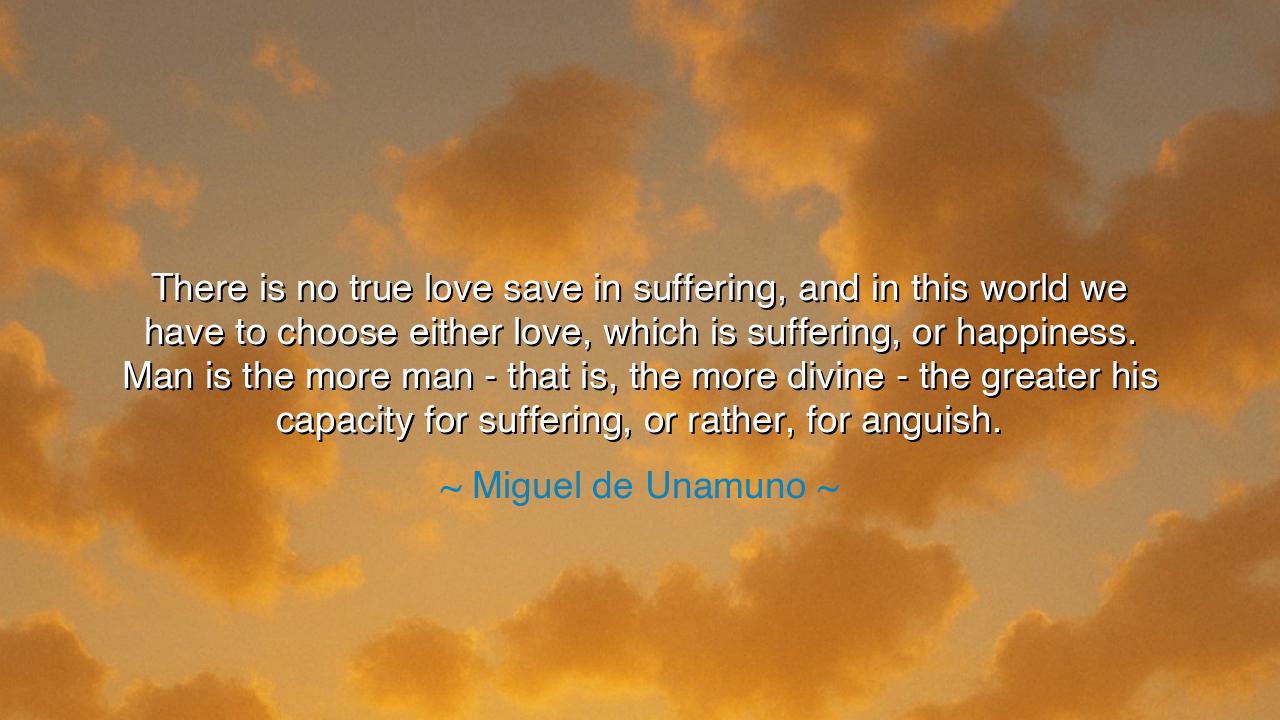
There is no true love save in suffering, and in this world we
There is no true love save in suffering, and in this world we have to choose either love, which is suffering, or happiness. Man is the more man - that is, the more divine - the greater his capacity for suffering, or rather, for anguish.






“There is no true love save in suffering, and in this world we have to choose either love, which is suffering, or happiness. Man is the more man — that is, the more divine — the greater his capacity for suffering, or rather, for anguish.” Thus spoke Miguel de Unamuno, the Spanish philosopher, poet, and prophet of the soul’s struggle. In these words, he unveils one of the deepest paradoxes of human existence — that love and suffering are inseparable, and that the road to the divine passes not through ease, but through anguish. For Unamuno, to love truly is to expose oneself to pain, and to suffer is to awaken the spirit that makes a man more than flesh, more than instinct — to make him divine.
The meaning of his words is both fierce and tender. Unamuno tells us that love, in its truest form, is not mere pleasure or comfort; it is a sacrifice, a burning of the self for the sake of another. The one who loves must be willing to suffer loss, disappointment, and even despair, for love is not the pursuit of happiness, but the surrender to vulnerability. Happiness without suffering is a shallow peace, a fragile illusion — while love transforms suffering into meaning. In this way, pain becomes holy, for it reveals the depth of the human heart. The more a man is able to endure in the name of love — for his beloved, for his faith, for his country, or for truth — the more human, and therefore the more divine, he becomes.
The origin of these words lies in Unamuno’s lifelong conflict between faith and reason, between the longing for immortality and the certainty of death. Living in Spain at the turn of the 20th century, during times of political unrest and spiritual decay, Unamuno was haunted by the thought that life without suffering is life without depth. In his writings, especially The Tragic Sense of Life, he speaks of the torment of the thinking soul — a man caught between doubt and belief, yet refusing to let go of either. To him, this inner anguish was not a curse but a blessing, for it was proof of the soul’s yearning for eternity. In this way, suffering was not merely pain — it was the sign of love reaching beyond the mortal toward the infinite.
History offers its own reflection of this truth. Consider the life of Christ, whom Unamuno deeply admired — the divine made human through suffering. Christ did not come to rule with power or bask in happiness; He came to love utterly, and through that love, to suffer completely. The cross, symbol of agony and sacrifice, became also the symbol of redemption and transcendence. Likewise, think of Mother Teresa, who lived among the poorest of the poor, enduring the pain of doubt and the weight of others’ suffering. Yet in her anguish she found divinity — for love, even when it brought her no joy, made her more truly alive. In these lives we see that suffering, far from negating love, perfects it.
To choose love in this world, then, is to accept suffering as its companion. The one who loves deeply will inevitably ache — for love risks loss, and loss is the price of caring. The one who seeks only happiness will build walls against sorrow, and in doing so, will also shut out love. Unamuno challenges us to live dangerously — to open our hearts wide enough to be wounded, to care enough to feel anguish. For in anguish lies the revelation of the soul’s capacity for greatness. The more divine a being is, the more he suffers for love’s sake — for God Himself, says Unamuno, is not indifferent, but weeps with the world He created.
To live by this teaching requires both courage and faith. Do not flee from pain when it comes, but ask what it teaches. Do not hide from loss, but honor it as the shadow of love. If you love another person, accept that your heart will break; if you love your calling, accept that it will test you; if you love truth, accept that it may destroy your peace. Yet in each of these sufferings, you will grow — your heart will expand, your soul will deepen, and the divine spark within you will shine more brightly. Suffering, embraced through love, becomes transformation.
The lesson, then, is eternal: do not seek a life without pain, but seek a life worthy of pain. To love is to suffer, yes — but to suffer is to live fully. For the man who avoids anguish in search of comfort will find only emptiness, while the one who accepts suffering for love’s sake will find meaning, beauty, and grace. As Unamuno teaches, the measure of one’s divinity is not how much happiness one possesses, but how much love one can bear. So, my child, when suffering comes — as it surely will — do not curse it. Let it make you more tender, more courageous, more alive. For in anguish, as in love, the soul becomes eternal.






AAdministratorAdministrator
Welcome, honored guests. Please leave a comment, we will respond soon